After a phone conversation with Turkey’s president Recep Tayyib Erdogan last Sunday, Donald Trump promptly stated that they had agreed on a withdrawal of US troops from Kurdish areas of Northern Syria and given the green light for a Turkish incursion. As of yesterday afternoon, this invasion has begun.
According to reports, the offensive started with air attacks and the shelling of the towns of Ras Al Ayn, Tal Abyad, Ayn Issa and Mishrafa, but has since spread to other targets. It has also been reported that the next phase has begun, with incursions into Syrian territory by Turkish forces, along with mercenary Syrian Islamist groups.
The Kurdish YPG forces who have controlled the area are determined to put up a bitter resistance. But it is undeniable that they will be in a very disadvantageous position against the Turkish army, which is the second-largest army in NATO.
Already, the shelling has resulted in dozens of fatalities. Should the Kurds fail to repel the attack, there is no doubt that the invading forces will show no mercy. Just as they did during the invasion of Afrin last year, the Islamist fanatics, who act as Turkish shock troops, will rape, burn and murder everywhere they go. Thousands will be killed and tens of thousands of men, women and children will be driven out of their homes.
What does Erdogan want?
After talking with Trump, Erdogan wasted no time starting the offensive to create what he recently dubbed his “peace corridor”. This plan, which he also presented at the recent UN General Assembly, entails the Turkish invasion of a 30 (or potentially up to 100) mile broad strip of Northern Syria, the area presently inhabited by Syria’s Kurds, which Turkey would control via its proxy forces in the Syrian National Army: a restyled force consisting of Islamist mercenaries, formerly part of the so-called Free Syrian Army. Here, some 2 million of the 3.6 million Syrian refugees who live in Turkey at present would be resettled.
Of course, there is nothing peaceful about Erdogan’s invasion, which if carried out to its final stated aim, will come at the cost of thousands killed and the displacement of millions of ordinary Kurds. In reality, Erdogan is trying to re-engineer the ethnic makeup of the area to install an Arab-based protectorate, which is supposed to act as a “buffer” against the Kurds. This would also allow him to gain further control over the area by inciting national ethnic strife between Arabs and Kurds.
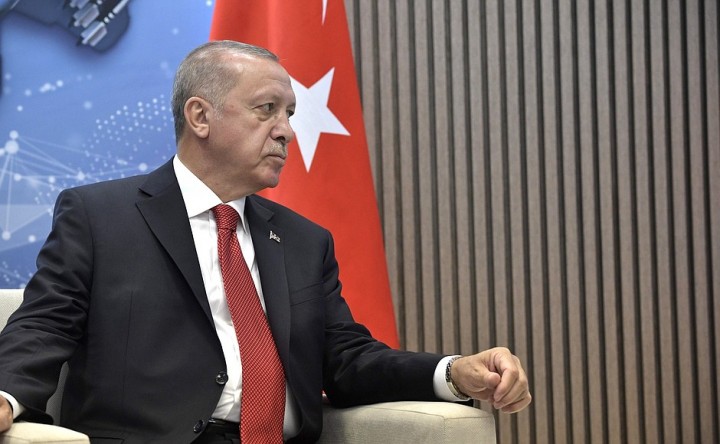
When he came to power, Erdogan actually leaned on the Kurds against the traditional Turkish Kemalist bourgeoisie. He criticised the national oppression of the Kurds and opened up talks with the Kurdish Workers’ Party (PKK) leader Abdullah Ocalan. But this quickly changed as the PKK-linked People’s Democratic Party (HDP) entered parliament with 13.1 percent of the vote in 2015, thus becoming a focal point for the rising class struggle and anti-Erdogan mood in Turkey.
At the same time, the PKK’s sister party, the PYD (and its military arm, the YPG) rose to take power and set up what is known as Rojava, in the vacuum left in Northern Syria after Bashar Assad was forced to retreat in the face of a revolutionary movement with roots in Western Syria. The brave YPG fighters, fighting for emancipation from national oppression, for a homeland, and on the basis of leftist and socialist ideas, quickly became the most efficient anti-Islamic State fighters in Syria. This pitted them directly against Erdogan, who was arming and supporting IS – and other Islamist outfits – in order to prepare for his own imperialist ambitions in Syria. At the same time, the Kurdish de-facto independence in Rojava became a powerful beacon for Kurds inside Turkey. Thus, the rise of the Kurdish liberation movement became an existential threat to Erdogan in every way. Meanwhile, as the Turkish economy started to stall and Erdogan’s star slowly to fade, he became increasingly dependent on rabid nationalism and anti-Kurdish sentiments to maintain power. That is the basis of Erdogan’s hostility towards the Kurds, and his determination to eliminate their autonomous region in Northern Syria.
In the previous local elections, Erdogan saw his biggest setbacks in his almost 20 years of being in power, losing the elections in major cities such as Istanbul and Ankara. The Turkish economy is under serious strain and Erdogan is losing ground very fast as the class struggle intensifies. In this context, the question of Syrian refugees has become a hot topic in Turkey, where the bosses often use desperate Syrians to undercut the meagre wages of Turkish workers. This has been used by the opposition to whip up xenophobia and hatred towards Syrians. Many are angry that Erdogan has been spending billions on his intervention in Syria, while living standards are falling sharply in Turkey. By dumping Syrian refugees in the Kurdish areas, he can simultaneously solve the economic problem of taking care of them, silence his critics at home, and win an important military victory in an imperialist adventure, which has so far only led to setbacks and humiliation. If he manages to maintain a protectorate in Northern Syria, he can use it to whip up nationalism and rally the most-reactionary layers around his neo-Ottoman plans. In reality, however, what this reveals is not Erdogan’s strength, but the process of his weakening, which we have witnessed in the past years. Desperate to shore up his position, he is forced to take risks, which can easily backfire, just like all of his ambitions to intervene in the region have backfired.
Trump and the crisis of US imperialism
After his declaration about withdrawing US troops, Trump went through a flurry of contradictory tweets and statements that seemed to defend as well as apologise for his actions. At first, he defended his decision by stating that Turkey is an important trading partner and NATO member. Then he said that he would keep supporting the Kurds and that “if Turkey does anything that I, in my great and unmatched wisdom, consider to be off limits, I will totally destroy and obliterate the Economy of Turkey (I’ve done before!).” Then he went on to say that US presence in the Middle East was the biggest mistake in the history of the nation, and that “Now we are slowly & carefully bringing our great soldiers & military home. Our focus is on the BIG PICTURE! THE USA IS GREATER THAN EVER BEFORE!” Yesterday, he seemed to defend his actions because the Kurds apparently did not help the United States during World War Two.
Of course, these manic statements say something about Donald Trump’s state of mind, but they also reflect the internal divisions within the US ruling class and the crisis of US imperialism. These divisions had already been revealed earlier, in the Syrian Civil War where, for instance, the CIA-supported Islamist forces and Pentagon-backed Kurdish forces clashed around the towns of Azaz in 2016, and on many other occasions. But this conflict had been buried and a “ceasefire” between the two wings of the establishment had de facto been in place, which lasted as long as nothing moved in Syria. But sooner or later, a decision had to be taken: either the US would entrench itself deeper in Syria, at the cost of a greater conflict with Turkey and probably a defeat further down the line, or it would withdraw, at the cost of strengthening Russia and Iran. There was never a “right” thing to do from the point of view of the Imperialists. Nevertheless, the conflict has now erupted again.
While Trump was declaring that the US would withdraw from Syria (although not giving a firm deadline for such a withdrawal) the Washington Post reported that “Behind the scenes, Defense Department and State Department officials have rushed to reassure other U.S. allies operating in Syria — principally France and Britain — that only a handful of U.S. troops were being moved and that the presence and mission of the total force of about 1,000 Americans in northern Syria would remain unchanged”. The Pentagon, which wants to use Kurdish forces as a bulwark against the spread of Russian and Iranian influence, has clearly also been sabotaging the withdrawal and dragging out matters as much as possible.
Furthermore, politicians from both US parties in congress have been criticising Trump. Republican right-winger Lindsey Graham has joined with Democrats to push a bill sanctioning Turkey’s military and even Erdogan himself. Other hawks, such as Marco Rubio and Adam Kinzinger, all heavily criticised Trump’s decision. In the context of an impending impeachment and next year’s presidential elections, the support of these Republicans is crucial for Trump. From their point of view, a withdrawal from Syria will be an admission of defeat to Russia and Iran. It would also be a humiliation internationally, opening US imperialism up for attack – both from enemies but also from allies, who can no longer trust that US imperialism will stand by them.
And they are right. But as Trump also correctly pointed out, the US has spent trillions of dollars, and thousands of dead soldiers, on wars in the Middle East fighting for others, such as the European and Gulf rulers. The campaign in Syria is no different. He also pointed out that the US is keeping tens of thousands of IS prisoners in Kurdish territories who would otherwise escape to Europe, but European powers only participate in the US intervention in Syria on a very limited basis. Now, those IS prisoners will probably go free, and according to Trump, become Europe’s problem. Meanwhile, all of these wars have left the US ruling class with a multi-trillion-dollar public debt and a deep-running political and social crisis. The US masses are weary of war, and Trump promised to withdraw US troops from the Middle East in his election campaign, something he is intent on living up to in the run-up to his re-election.
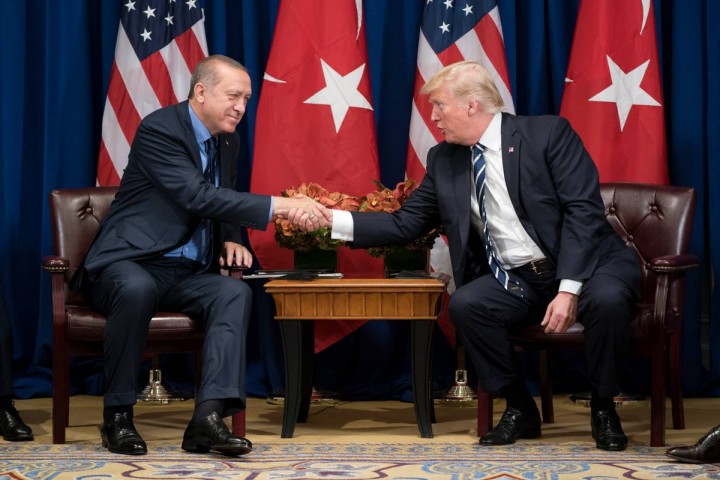
Trump cannot see much use for the Kurds, who occupy a barren land with an underdeveloped economy, and who are of little international importance. On the other hand, he sees how a US presence in Syria is pushing Turkey – a key NATO ally, in which the US has nuclear weapons and an airbase – into the arms of Russia and Iran. In past years, Erdogan has been diverting his path from that of US imperialism. This was particularly clear during the rise of IS in Syria and Iraq. The US saw the organisation as a threat to the stability of the region, while Turkey and other US allies in the Gulf were providing it with financial and logistical support to attempt to overthrow Assad and dislodge Iranian influence from Iraq, after which they thought they could sweep in and install friendly puppet regimes.
But, unable to deploy significant amounts of troops to fight IS, US imperialism was forced to lean on other forces. In Iraq for instance, it had to rely on Iran’s network of militias. But seeing how that alienated the US’s Gulf allies, it started leaning on the PKK-linked militias in Syria, as a counter-weight to Iran, and later Russia. But this alienated the Turkish ruling class, which sees an existential threat in any potential Kurdish independence and which also has grand imperialist plans for Northern Syrian and Iraq. The crisis that ensued put Turkey and the US in two opposing camps in the Syrian Civil War, and finally also led to Turkey forming closer bonds with Russia and Iran. Trump believes that, by pulling out of Syria and dropping the Kurds, he can reforge an alliance with Erdogan.
The US congress however, believes that this is an admission of defeat – a concession to Russia and Iran – and a humiliation internationally. And they are correct. Russia and the Assad regime, flanked by Iran, are ready to move in, disarm the Kurds and expand their influence in Syria. The Russians in particular are using this influence to become a decisive power in the region at the expense of the US. But that is not Trump’s call. Trump is merely accepting the reality – just like Obama did when he made a nuclear deal with Iran – that US imperialism is in crisis and has reached a limit. Its economic, political and social condition does not allow for it to intervene militarily as it wishes.
At the same time, it is of course also clear that a deal has been struck between Trump and Erdogan: a quid pro quo that we will learn more about in the next period. Being extremely isolated in the US ruling class, Trump is always looking for points of support, such as the one he has with the Saudi crown prince Muhammad bin Salman, and with Benjamin Netanyahu (although it would appear that Netanyahu is about to have his wings clipped).
Hypocrisy
Whatever one might think about Trump, of all the bourgeois politicians, he is the most honest about his reactionary aims and intentions – and it is precisely for his honesty the bourgeoisie hates him so much. All the Western politicians’ talk of the democratic rights of the Kurdish people is nothing but a cover for their own narrow self-interest. Only a few years ago, the same Kurdish forces were labelled as terrorists. In fact, the PKK, which is the sister organisation of the PYD, remains on the terror list of the US as well as the EU.
The reactionary Saudi rulers, along with their Egyptian puppets, have come out against the Turkish operation. But as most people know, this is not due to Muhammad bin Salman’s or Abdelfattah al-Sisi’s particular interest in the democratic rights of the Kurds, but because the Saudis saw the Kurds as a potential anti-Iranian proxy. They, along with Israel, even recently used Kurdish air bases to strike against Iranian-backed militias in Iraq. Furthermore, the Saudis see Turkey as a rising competitor for supremacy in the region, in particular for the domination of Sunni-based areas. Al-Sisi is of course further impelled to fight Turkish imperialism due to the support it gives his Muslim Brotherhood foes at home.
Apparently, the United Nations Security Council is also set to meet to discuss Syria today, at the request of the five European members: Britain, France, Germany, Belgium and Poland. But what more than words will these ladies and gentlemen bring to the table? As Donald Trump has pointed out many times, if the Europeans really care, they are more than welcome to increase their military presence in the area and take over the work that the US has been doing. But of course, the EU leaders would rather keep a safe distance from the wars and bloodshed that they benefit from. Their pathetic hypocrisy and impotence are perhaps the vilest of all. It was only in 2016 that the EU agreed to pay billions of Euros to Erdogan, in exchange for Turkey blocking the flow of Syrian refugees crossing from Turkey to the EU. Today, he warned that, should the EU designate his operation as an invasion, he would open the waterways and let millions of refugees enter its territory.
The plight of the Kurdish people
The interests of the ruling classes, irrespective of where they are based, are diametrically opposed to those of the poor and oppressed masses. As always, the ‘small’ nations are so much small change in the games and struggles between the major powers. Once they are finished using them, they have no qualms about crushing them or allowing others to do so. The US, the EU, Russia, Iran, the Assad regime and even Erdogan have all at one point or another promised the Kurds some form of support. But they have all betrayed the Kurds as soon as it fit their interests.
These are lessons that the Kurdish masses are learning in the hardest way possible. But it would be an even-greater mistake for the Kurdish leaders to continue down this path of basing themselves on the support of imperialist forces. In the past few days, they have reached out to every major capitalist power possible for support. At first, they reached out to Russia and the Assad regime for support against Turkey. Of course, these powers would be more than happy to “help”, on the condition of the disarming of the YPG, the total dismantling of all the autonomous structures and democratic gains that the Kurds have achieved in Syria. It would be nothing but a total surrender.
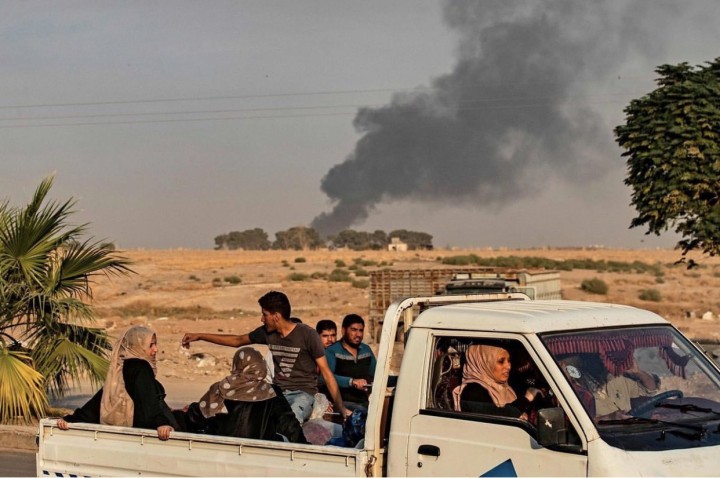
At the same time, Ilham Ahmed, the co-president of the Executive Council of Rojava, has travelled to Europe, where she held a press conference in the European Parliament, urging the EU not to “abandon” the Kurds, and calling for it “to implement a no-fly zone to punish Turkey for violating international law”. But the EU leaders are not interested in the rights of the Kurds, or anything else for that matter, except for the interests of their own bourgeoisie. As mentioned, it was only in 2015 that Turkey made a dirty deal with the EU; and in 2016, German Chancellor Angela Merkel visited Turkey and tacitly supported Erdogan while he was carrying out a bloody war against the Kurds in Turkey itself.
It is not even two years since Turkey invaded the Afrin canton of Syria, which was held by PYD forces. Back then, the Pentagon stated “we don’t consider [the Kurds] as part of our ‘Defeat ISIS’ operations, which is what we are doing there and we do not support them. We are not involved with them at all.” It added later that “We hope the operation in Afrin will end quickly and we have said that we know that Turkey makes every effort to limit civilian casualties. We do not have any doubt about efforts in that regard.” That is, the Pentagon was hoping for a swift victory for Turkey! The EU of course was crying crocodile tears as usual, but the then-British foreign minister Boris Johnson insisted that “Turkey has the right to want to keep its borders secure”. Meanwhile, Germany continued supplying advanced weaponry to Turkey and Russia, who had been a “peace-keeping” force in Afrin, then swiftly withdrew and opened Syrian airspace for Turkish jets to rain destruction on the heads of tens of thousands of innocent people. Meanwhile, the ill-equipped Kurdish forces, who fought bravely, stood no chance against the Turkish military machine in a head-on battle. The only solution would have been to build a movement in Turkey and appeal to the class instinct of Turkish soldiers, attempting to break the Turkish army on class lines, but that seems to be a closed book to the PYD and PKK leaders.
And still, even after these experiences, the Kurdish leaders have continued their dependence on various capitalist powers. Of course, there is nothing wrong with a revolutionary movement exploiting divisions between the imperialists. But it is a fatal mistake to base oneself on these powers, and to invite them in!
In fact, this tactic has never brought the Kurdish movement much. At every stage, the major steps forward by the Kurdish liberation movement have been on the basis of the revolutionary and class-based movement of the masses and not collaboration with the imperialists. In Turkey, the movement gained ground when the HDP stood on an all-Turkish platform (that is, one not confined to the Kurdish areas), and based itself on radical rhetoric and class-based demands. For the first time since the 1980s, it began to bridge the divide that the ruling class had instilled between the Kurdish and Turkish workers – and that was what made it a potential existential threat to Erdogan. In Syria as well, as we have stated before, it was the all-Syrian revolution – which was in fact strongest in the west of the country – that created a power vacuum, which allowed the PYD to take over.
The appeal of the Kurdish movement, basing itself on democratic structures and a revolutionary outlook, spread far beyond the Kurdish areas and inspired millions of workers, poor and youth in the Middle East and beyond. But instead of basing itself on this revolutionary potential, the Kurdish leaders tried to base themselves on manoeuvres between one imperialist power after another. And in doing so, they had to give concession after concession.
In Iraq, where hundreds of thousands of youth looked to the PKK movement and Rojava’s council structure for political reference, it is clear that the leadership of the PKK made a de facto agreement with Iran, which means that the PKK does not spend resources building a mass organisation there (an “understanding” that more-or-less also covers Iran). In fact, in Iraqi Kurdistan, the PKK has supported reactionary liberal and bourgeois organisations instead of fighting on a bold, independent programme. Its Iraqi militia organisation, the YBS, has also received funds and wages from the Iraqi central government. It was at least at one point counted as a member of the Popular Mobilisation Units: an Iranian-dominated umbrella organisation, mainly composed of reactionary Shia based militias.
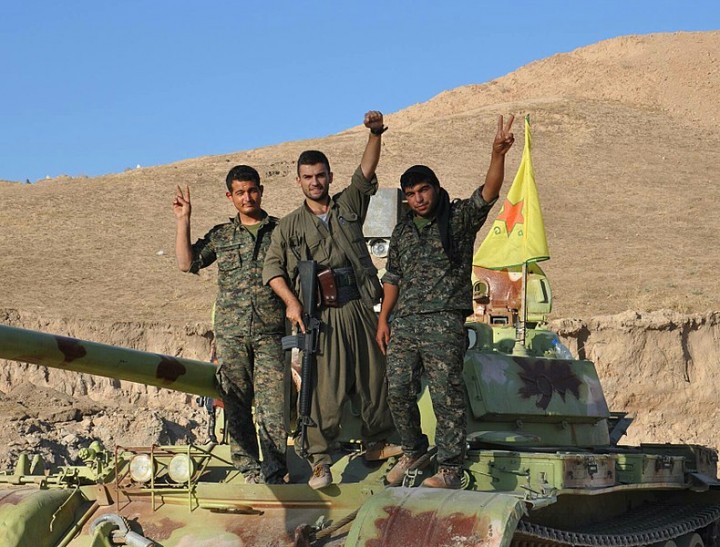
of relying on this or that imperialist power rather than the
masses’ own strength, and they are making the same
mistake again / Image: Kurdish Struggle
In Turkey as well, the HDP, dominated by the PKK in Kurdish areas of Turkey, held de facto power in a whole series of regions and in large towns such as Cizre, Silopi, Hakkari and Sirknak. When Erdogan began his war on the Kurds in 2015, the masses of the area rose and were prepared to fight to the end, but the PKK leaders, having plenty of arms, resources and experience from the war in Syria, refused to arm the population or even to call for a general strike – for fear of antagonising their allies, mainly the US. They also pushed the HDP into a more Kurdish nationalist line, which only played into Erdogan’s hands of whipping up nationalism to cut through the rising class struggle in Turkey. In the end, Erdogan’s war led to the displacement of tens of thousands of Turkish Kurds due to war and the demolition of huge areas, with whole towns and villages being levelled to the ground. This was a significant defeat for the liberation movement and lead to much demoralisation amongst Kurds.
In Syria as well, multiple concessions by the leaders of the movement have undermined it. In Afrin, as we have already explained, the leaders thought that Russia would protect them, but Putin sold them out without hesitating. He doesn’t care about the rights of national minorities in Russia, let alone in Syria. The PYD leaders also gave several other concessions to US imperialism, such as allying with the reactionary Shammar tribal forces and other reactionary groups, bringing them into the Syrian Democratic Forces (the main official military of Rojava); and watering down the Rojava constitution on several occasions. Leaders, such as Ilham Ahmed, have visited the US congress, engaging with Republican reactionaries such as Paul Ryan, and have even reached out to Saudi Arabia for collaboration on several occasions. This is of course besides curbing the PKK’s revolutionary activities in Turkey, Iraq and elsewhere in order not to step on the toes of their allies. All of this only serves to undermine the movement’s revolutionary authority in the eyes of the Middle Eastern masses: the only real allies of the Kurdish people. Even last June, at the request of the US, they agreed to pull back their heavy artillery from the border areas with Turkey and allow for joint US-Turkish patrols of the area! But as one Pentagon official admitted: “We have spent considerable time and effort to build the safe zone with the express idea that it would appease the Turks and prevent an incursion. The Turks just used it as a way to conduct reconnaissance for their operation. That was completely deceptive on their part.” Only a fool would be surprised by the deceptiveness of Erdogan.
At its height, the PKK movement controlled a huge swathe of land, covering the majority of the southern Turkish border. Their domain extended from Afrin, interrupted by Turkish proxies, then continued from Manbij through Northern Syria, Southeastern Turkey and Northern Iraq, where the organisation has controlled major areas of the Dohuk region and the Qandil Mountains, bordering Iran. This could have been the platform for a revolutionary struggle, first of all for Kurdish liberation (a call that would have gained a huge echo in all Kurdish areas) and further for an uprising of all the oppressed peoples of Syria, Turkey, Iran and Iraq, where the Kurds are based. But as we have seen, using the excuses of “we are too busy in Syria” and “we don’t want to open up too many fronts”; and basing itself on an idea of merely fighting for “autonomy” (whatever that means) within the existing (capitalist) states, the organisation has refused to do so. In reality, however, this merely covers for the desire of the PKK leaders to come to an agreement with the bourgeoisie. But the interests of the bourgeoisie are totally opposite to those of the millions of poor and oppressed Kurds. No amount of clever manoeuvres can change that. The ones who are being duped are not the bourgeoisie, but the Kurdish leaders, who thought they had figured out the key to recognition via deals with the capitalists.
For a revolutionary war against Erdogan’s Aggression
But now they are being sold out, along with the rest of the Kurdish people: a wholly predictable event. Now, tragedy yet again awaits the Kurds, who have been tested so many times in the past 100 years. The only way of averting it is not to hold press conferences in the EU administration buildings, but by returning to the revolutionary traditions of the Kurdish people, and by appealing to the class solidarity of the masses in the region and internationally. First, a call for a general strike in the Kurdish areas of Turkey should be issued, along with the arming of the people and their organisations in workers’ and neighbourhood self-defence committees. The war must be brought to Turkey, in a revolutionary form and on a class basis – and not through counter-productive terrorist attacks, which only serve to strengthen Erdogan’s grip on Turkish society. Then, the Kurds need to make a public break with US imperialism – which is hated across the region. Then they must appeal to unions and working-class organisations across Turkey to join their strike for ending of the war, but also make a declaration to join a broader struggle against the Erdogan regime, for higher wages, jobs, healthcare, education and other social and economic demands. This is sure to find a broad echo in Turkey, where living standards are declining rapidly under the impact of an economic crisis.
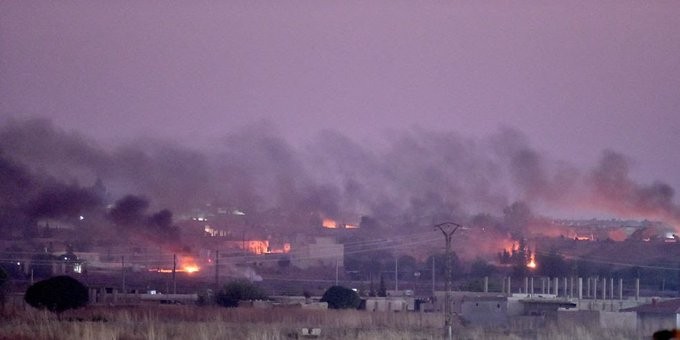
the masses in the region, breaks the Turkish army on
class lines, and appeals for international solidarity
can resist the Turkish war machine / Image: fair use
Appeals should also be made and smuggled into Turkish military barracks and camps for a joint struggle for peaceful coexistence, exposing Erdogan’s reactionary nature and his attacks against the Turkish workers and poor. It is clear that Erdogan is very nervous about deploying Turkish soldiers in battle, for fear that the general anger and dissatisfaction in Turkish society would also be reflected in the army. That is why all the initial fighting appears to be carried out by jihadi mercenaries. This reaffirms that Erdogan is weak at home and that there is a way into the Turkish army, which can only be defeated by the Kurds if it is broken on class lines. On a revolutionary basis, faced by armed mass resistance in Syria as well as in Turkey, the army would come under enormous pressure and the conditions for class-based mutinies would emerge.
The same actions need to be taken throughout the region, in particular in Iraq, Iran and Syria, where a call for a united struggle against the hated regimes would find a wide echo. In Iraq, the past week has already seen radical mass protests against the regime. In Iran as well, the masses are sick and tired of the mullah regime.
Also, the strikes of dockers in Europe against shipments of weapons to Saudi Arabia show that there is potential for working-class solidarity action in the west. The unions and working-class parties should start immediately organising boycotts and strikes against shipments of weapons and resources used to fuel the Turkish war-machine.
If such a course of action is taken boldly and decisively, the Kurds can win against the Turkish army. But if the Kurdish leaders keep facing towards the imperialists and the bourgeois, defeat is guaranteed one way or another. The Kurdish masses have shown time and time again that they are willing to fight until the last. It is time to bring that fight to its conclusion, by taking it to the capitalist regimes that have been oppressing them for the past 100 years.
- Down with the Turkish war of aggression against Rojava!
- Down with the imperialists, who are all complicit in this atrocity!
- Long live international working-class solidarity, organise boycott-strikes against weapons shipments!
- Turn the defence against imperialist attacks into a revolutionary war of liberation!
- For an independent socialist Kurdistan as part of a Socialist Federation of the Middle East!

